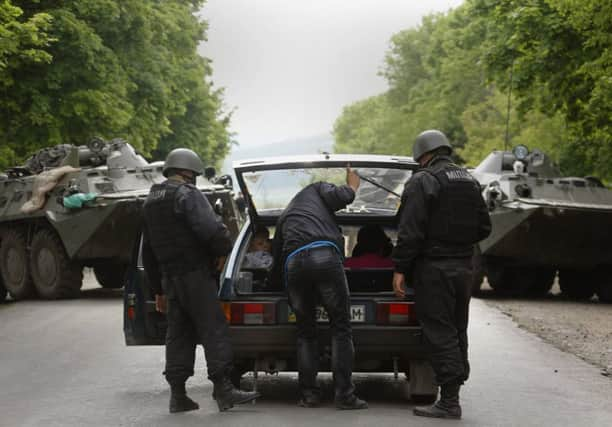Ukraine agrees to European-backed peace talks


But with no invitation for the pro-Russian insurgents who have declared independence in two eastern regions, it was unclear what the negotiations might hope to accomplish.
Ukraine’s prime minister Arseniy Yatsenyuk was yesterday to chair the first in a series of talks set to include national politicians, government figures and regional officials as part of a peace plan drafted by the Organisation for Security and Cooperation in Europe (OSCE).
Advertisement
Hide AdAdvertisement
Hide AdMr Yatsenyuk gave no indication that he would invite the opposing side into the process, as called for in the OSCE plan.
As he launched the talks, he was dismissive of them, thanking the OSCE for its efforts but saying Ukraine has its own plan to end the crisis, which he did not reveal.
Acting Ukrainian president Olexandr Turchynov said the talks would involve “regional elites”.
Mr Turchynov said “the government will act against those who are terrorising the region with arms in hand, in line with the law, by continuing an anti-terrorist operation against them”.
Many insurgents in the east shrugged off the talks as meaningless.
“The government in Kiev does not want to listen to the people of Donetsk,” said Denis Patkovski, a member of pro-Russian militia in Slovyansk, which has seen some of the most intense fighting in recent weeks. “They just come here with their guns.”
The European Union enlargement and European neighbourhood policy commissioner Stefan Fule welcomed the launch of the talks, voicing hope that the next such meeting will take place in the east.
Russia has strongly backed the OSCE road map.
The US, while saying it is worth a try, views its prospects for success with scepticism.
Advertisement
Hide AdAdvertisement
Hide AdUkraine and the West have accused Moscow of fomenting the unrest in eastern Ukraine, where insurgents have seized administrative buildings, fought government forces and declared independence for the Donetsk and Luhansk regions after a referendum last weekend. Ukraine and Western powers called it a sham.
Ukrainian forces have mounted an offensive against the insurgents, and dozens have died in the fighting.
On Tuesday, the defence ministry said six soldiers were killed by rebels who ambushed a convoy near the city of Kramatorsk in the Donetsk region – the deadliest attack the Ukrainian military has seen since it began last month to try to uproot the mutiny.
A defence ministry spokesman said about 30 gunmen positioned themselves on both sides of the road and used rocket-propelled grenades to knock out the military vehicles during a battle that raged for about one hour. He said nine servicemen were wounded.
The OSCE plan calls on all sides to refrain from violence, as well as an amnesty for those involved in the unrest and talks on decentralisation and the status of the Russian language.